
Recently on Cyclingnews.com |
59th Vuelta a Espaņa - September 4-26, 2004
An interview with Aitor Gonzalez Jimenez, August 30, 2004
I'll be back
By Hernan Alvarez Macias
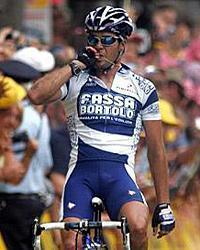
|
He was the surprise package at the 2002 Vuelta a Espaņa. Everything seemed ready for an Oscar Sevilla victory, but Kelme team-mate Aitor Gonzalez had other ideas: Gonzalez audaciously attacked his team leader on some key stages, and after winning the final time trial, it was Gonzalez who wore the final golden jersey in Madrid, beating Sevilla and Roberto Heras.
His victory surprised many people, and his performance bore nicknames including "Speedy" and "TerminAitor".
After a few quiet seasons, the TerminAitor is back, showing his great versatility by winning Stage 14 at the 2004 Tour de France. He is superb in time trials, can hold his own in the mountains and smart enough to get in a breakaway and attack at the right moment, as he demonstrated that day in Nimes.
In a few days from now, another Vuelta a Espaņa will begin. And Aitor Gonzalez will be among those most-watched. As a former champion, he will always be a candidate for the overall win.
Cyclingnews: How was your Tour de France?
Aitor Gonzalez: I don't think I performed at the level I hoped. But I won a stage and this is something that is always important. I wasn't able to get in the top positions on the general classification, but that stage victory is like a little candy to lessen the bitterness of not being with the leaders in the mountains.
"I don't believe one can think of what would have happened if I hadn't won the Vuelta. It is obvious that when a rider wins the Vuelta, he thinks he is able to do it again." |
CN: Why did this happen?
AG: I don't know. I would like to know why it happened.
CN: But did you think about the reason for the bad performance? Maybe it was because you didn't train well or you didn't prepare yourself well for the race?
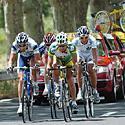
|
AG: No - the truth is that now I am doing some medical tests because it was rather weird. I had felt very good during the first week and then suddenly it was like I lost all of my energy. I felt very weak. It wasn't normal.
It happened to me with less intensity on previous occasions, but I hadn't paid much attention to it. It is very usual to have a day when you can not pedal and it's not a thing you should worry about. But when you cannot pedal almost every day, one thinks that something must be wrong. As I said, as soon as I ended the Tour, I started doing medical tests to see what happened.
CN: I guess you were happy with your stage win though. You've now won at least one stage in each of the three Grand Tours.
AG: Yes. I was able to win one stage in the three tours and that's something very few riders have been able to achieve. And look, I'm one of them!
CN: You are a very complete rider, but maybe you would need to ride better in the mountains in order to win the TdF or the Giro d'Italia, right?
AG: I think the Tour mainly requires being in great condition because its mountains are not too tough in terms of their steepness. There are very large climbs, but in the Giro or in the Vuelta you have to face climbs with gradients of 15 or 18 percent. It's not usual to see a Tour climb with more than 10 percent gradient.
The point is that in France, climbs are longer and one needs to give 100 percent because the stages are really long. Every day is vital because there is so much tension from the very first day and that erodes oneself. The Tour is a race that is demanding even before one starts riding it. It's really harsh at the end, not for the route but for the race tension.
CN: With few very high mountains in this year's Vuelta a Espaņa, will the route be better for you?
AG: This year the Vuelta has, I believe, seven uphill finishes, two flat time trials and a hill-climb time trial. It should be favourable for climbers in theory. If I do well in the mountains, then I will be among the climbers, and then I will try to get the most of them in the time trials that suit me better. It will depend on how things go during the race.
CN: What form will you take into the race?
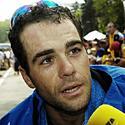
|
AG: I hope to reach the start well. At least I would like to begin in good condition. The results of the tests I made are not available yet. I actually don't know if there's a problem of any kind. I am currently training as if nothing happened; I'm really feeling good and I'm very happy. But I will still try [to win] with that uncertainty if there's a problem.
CN: What kind of problem do you suspect it might be?
AG: I actually don't know. I've made some analyses; it seems to be a drop in my blood sugar level at precise moments. Some drop of energy related to glucose in my blood.
CN: Do you think you would be the successful rider you are today if you hadn't disobeyed team orders at the 2002 Vuelta?
AG: Achieving a great victory really brings out a rider's confidence. At that time, my career was rising and aiming towards the Grand Tours. I don't believe one can think of what would have happened if I hadn't won the Vuelta. It is obvious that when a rider wins the Vuelta, he thinks he is able to do it again. And if he never wins, there is always a doubt whether he is actually able to resist the three weeks or not.
CN: Can we say that you have a champion's personality, a winner's way that is different from other riders?
AG: (Laughs) You mean my personality, right? You talk about me as a rider... I don't know; the truth is that they [the media] exaggerate a bit about it. Sometimes, I read some articles about me that some journalists have done and I wonder if that person really knows me. Many articles are written many times about people just for their looks and without knowing what they are really like.
The people who don't know me think about me as you just said. But when these people meet me, everybody agrees that I'm a different person from the one they thought I was. Maybe it's because in the races I have an image and in normal life I'm different.
CN: Are you going to ride some races before the Vuelta?
AG: Yes, I'll ride the Championship of Zurich next [August] 22.
CN: Who named you "Speedy" Gonzalez? Why do you have this nickname? I read Erik Dekker called you "Speedy" for the first time.
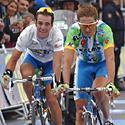
|
AG: (More laughs) There was a Tour de France stage when I broke away together with Erik Dekker, [Marc] Wauters and another rider, but I'm not sure if they gave me that nickname that day; I think it was because of something I did in the Giro. I'm not sure why I have that nickname, but I hear it, particularly in Italy. Sometimes, the Italian media call me "Speedy".
CN: Which are your plans after the Vuelta?
AG: I would really like to rest. Things didn't go well this year and I really want to rest as soon as possible, but the World Championships are always nice to compete in. One doesn't realise how tired they are until two days after a three-week race, even if I end the Vuelta in good condition. It happened to me in 2002 when I had won the Vuelta - after that, I competed in the World Championships and I was truly exhausted. So, in order to race [the World Championships], I would need to stop for one week and then decide if I go.
CN: Would you have liked to compete in the Olympic Games?
AG: Yes, sure. The Olympic Games are an opportunity that you have only a few times in your life. A sportsman's career has a limited time and a cyclist's career is not very long. The Olympics are held every four years, so in your sporting life you may have one or two chances of going to the Games. To have the possibility and not to take it is something really sad.
CN: Do you think you would have had more possibilities than Spain's Jose Ivan Gutierrez or Igor Gonzalez de Galdeano in the time trial?
AG: It's hard to say it because the three ended up the Tour very tired. Even though there's time between both competitions, nobody knows. I really don't know how these two riders will do in the Olympics. However, it's a decision the national coach [Francisco Antequera] made and he certainly knows why.
CN: I read in an interview you gave in 2002 that you have said that you were not a methodical person with your work. Have you given that a rethink?
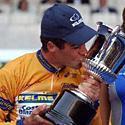
|
AG: I think I am what I am and it's difficult to change me. I'm not methodical in my work as other riders are, but that doesn't mean I don't give a lot of time to my work or that I don't try to give my best. The point is that there are riders who train and then they write down how they trained, how much they weigh, what they ate, what they didn't eat. I train, I come home, and I want to watch the TV; I like to live my life.
CN: And when you are not racing what do you usually do?
AG: I try to spend the most of my time with my friends, because I spend a lot of time far from home and I don't have as much time to enjoy my friendship with them as I would like to.
CN: Is it a problem to be in a team like Fassa Bortolo that has a tremendous sprinter like Alessandro Petacchi, considering you are always fighting for the overall victory in the big races?
AG: There are teams that are focused on the overall victory as their only goal. But if there's a rider like Petacchi in the team, one must help him. I think Petacchi is a rider who deserves the confidence of a team and if I can help him, I'm the first to do it.
